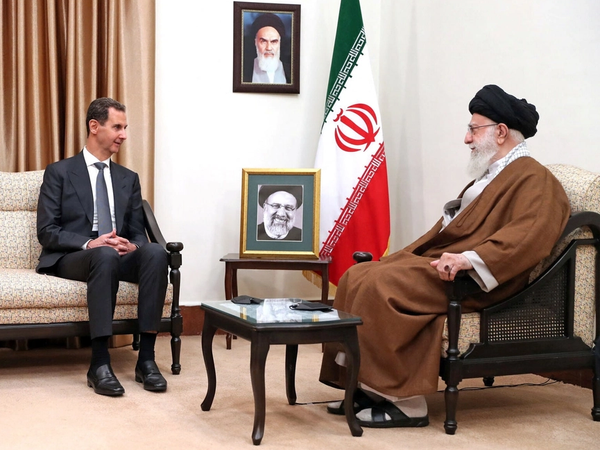Iran’s Supreme Leader Ali Khamenei accused the United States and Israel of orchestrating the overthrow of Bashar al-Assad, Syria's longtime president and a close ally of Tehran.
The remarks were Khamenei's first since Assad fled the country for Russia on Sunday in the face of a shock rebel advance, but offered little indication of what Iran's next strategic move would be after suffering the epochal setback.
“There should be no doubt that what has happened in Syria is the result of a joint American and Zionist plan. Yes, a neighboring country of Syria has played a clear role in this regard, continues to do so even now—this is evident to everyone. But the main conspirator, the primary planner, and the central command rooms are in the US and the Zionist entity," he said in his first remarks on the Syrian uprising since Assad's departure on Sunday.
Khamenei’s reference to a neighboring country was widely interpreted to mean Turkey. Over the years, Turkey has been a key backer of Syrian armed opposition groups. The power vacuum created by Assad’s fall has boosted Ankara’s regional position, weakening the influence of Iran and Russia on Syrian affairs.
“The aggressors I mentioned each have their own motives. Their goals are different—some seek to occupy land in northern or southern Syria, while America aims to solidify its foothold in the region," Khamenei added.
"These are their objectives, and time will show that, God willing, none of them will achieve these goals. The occupied regions of Syria will be liberated by the brave Syrian youth; have no doubt, this will happen,” he said.
Assad’s ouster has not only deprived Tehran of a strategic ally but also disrupted Iran’s ability to transport weapons to its biggest military ally, Hezbollah in Lebanon, through its land corridor. This route was a cornerstone of what is described as Iran’s Shia crescent, linking Tehran to the Mediterranean via Baghdad and Damascus.
In spite of the massive setbacks Israel has inflicted in recent months on both Hezbollah and Hamas in Gaza, also supported by Tehran, Khamenei said the Resistance - a term for Iran-backed militias across the region - would grow stronger.
"The more pressure you exert, the stronger the resistance becomes. The more crimes you commit, the more determined it becomes. The more you fight against it, the more it expands," Khamenei said. "Iran is strong and powerful—and will become even stronger."
The new government in Damascus, comprised of Sunni insurgents, signals a significant shift in the balance of power in the region. Syria's significance for Iran and the Islamic Republic's support for Hezbollah in Lebanon were so substantial that, over the years, Israel has also targeted several IRGC commanders in Syria as part of its efforts to counter Tehran and its regional influence.
In April, Israel struck the Iranian consulate compound in Damascus, killing Quds Force commander Mohammad Reza Zahedi, and other senior IRGC figures, triggering Iran's first ever direct attack on Israel in the same month.
Even after Assad's fall, Israel has continued to deliver significant blows to the remnants of both Assad's military forces and arsenal, and IRGC facilities, with around 300 airstrikes carried out since Sunday as Israel destroys any potential weapons falling into the hands of Syria's new extremist groups.
Iranian Islamic Revolutionary Guard Corps (IRGC) forces and militias such as the Fatemiyoun and Zainabiyoun brigades were deeply involved in defending Assad during Syria’s civil war.
These militias, composed mainly of Afghan and Pakistani recruits residing in Iran, were promised financial incentives and residency permits in exchange for their service. Despite Iran’s consistent denials of direct military intervention, these groups played a critical role on the ground.
